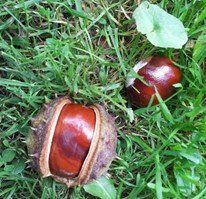Learning and Creativity this Autumn

What can you do this autumn to make the most of the out doors and the beautiful autumn colours? We collected different leaves and made an autumnal bouquet; we have been inspired to try some painting in these colours and we have been trying out composing some poetry too. One benefit of the shorter days is seeing the sunrise and sunset colours. But not everyone has short days and distinct seasons.
Talking with our colleagues in The Gambia and Sierra Leone this morning we were comparing the weather. This is something we are programmed to do here in the UK for some reason. Did you know that in The Gambia and Sierra Leone there are only 2 seasons dry and rainy season? Temperatures there this week were 42 degrees, we would love some of that heat over here in the UK right now but the trade-off for nearly year round sunshine is that they have heavy rains from July to October and due to Climate Change much like us they are experiencing strange weather at all times of the year.
Have you noticed this year that there have been huge crops of acorns? Well across the UK Oak trees are all producing an extraordinarily large crop of acorns. This is actually a natural phenomena, every few years some species of trees and shrubs produce a bumper crop to ensure that there is far more seed than can ever be eaten by predators, to ensure that there will be plenty to sprout and grow. This is called a ‘Mast Year’ as the collective term for fruits and nuts is ‘mast’. Find out more about this phenomena on the Woodland Trust website (https://www.woodlandtrust.org.uk/blog/2020/10/what-is-a-mast-year/). So, this year is a Mast Year for Oak, and there has been a lot of rosehips too.
We have been enjoying learning ourselves whilst hosting our Life Long Learning Series as well as welcoming lots of new people who have discovered the Steve Sinnott Foundation for the first time. We have discovered the possibilities of what can be done in an online conference, and tested out creative workshops, working together and how Zoom can be used to enhance learning for all and connecting with people all over the world. Which makes us feel strongly about the Global Digital Divide and what we can do about it.
We’d like to thank everyone who has taken part so far and share the two autumn poems we created in Sovel’s Quiet Mind Poetry webinar.
Autumn Seeds
Acorns and conkers
The currency of our future
This is not just a seed
It is a heart inside a hand
It is a pearl within a shell
It is a dream above the clouds
Seeds create comforting feelings in my hands
From the decomposition and decay of Autumn
New lives will be generated
And mighty trees will grow.
Seeds of the autumn
Hand in hand
The acorn and the conker.
Outdoors
Shared joy to be outdoors,
So fresh, summer flowers gone,
Flush of pink in cheeks.
Pink and red stripes against green,
Swelling and growing behind lost flowers,
Small dark seeds growing inside.
Anticipating the conker tree,
Crunchy flesh, waiting to be eaten,
Shiny conkers, waiting to be chosen.
Watching the pup smile,
Happy to walking too and,
Sharing joys outdoors.
Please share this post with anyone who would find it interesting, and leave a comment below to let us know what you have been doing this Autumn.
Thankyou for sharing the learning!







